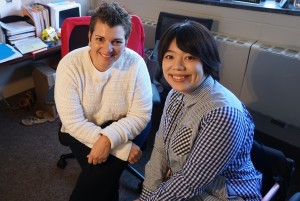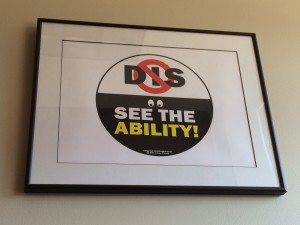This article is also available in: 日本語
Wonderful People No.2 :
Paula Possenti-Perez, Director of the Office of Disability Services at Syracuse University

The Office of Disability Services (ODS) is a place which provides reasonable accommodations and services for students with disabilities.
In Syracuse University, approximately 1,300 students registered with this office.
The majority of their disabilities are unobservable, such as learning disabilities, ADHD, and mental health.
I had an opportunity to interview the Director, Paula Possenti-Perez.
She studied education and counseling and has worked in higher education and disabilities field for 17 years.
Last year, she moved to Syracuse and started working at ODS in Syracuse University where have more opportunities and longstanding history of disability rights movement.

Counselors, coordinators and support staffs at ODS fully assist students in needs to create an inclusive learning environment.
The students who want to request accommodation, including temporary disabled students (for example, broken leg), they can register on the ODS website.
The ODS provides or assists the students to acquire
- note taking
- screen reader
- extended time on exam
- books in alternative format
- training of reading and writing
- use computer for writing essays by using spelling checker
- housing accommodation
- tutoring

One of the things Paula introduced and impressed me was “Smartpen”.
If you write something with Smartpen on a dedicated notebook which has sensor inside, it would be recording the sound around it and also synchronizing the recording with the writing notes.
It plays back the audio captured in the time when you took the note.
This can be used for students with ADHD or other disabilities.
Paula said this tool is much better method for capturing the lecture in the classroom, in stead of traditional peer notetaker or getting a copy of somebody else’s note.
Students can learn how to take a good note.
I believe that this tool would help people with disabilities not only at school but also at working environment.
Paula said,
The disabled population is very diverse.
Physical disabilities, learning disabilities, mental health, they are not necessarily cohesive group and experience challenges in the environment quite differently.
If most people picture ‘disability’ in their head, they would come up with wheelchair user.
But in large part, there’s a much greater population out there.
We are living in what we call ‘able-body world’.
Those able bodies are the majority and they are in power.
They don’t see the barriers in front.
It is still about the lack of inclusiveness in the environment both culturally and physically.
We still perpetuate medical model of disability even in media, TV, literature and so on.
When we continue to perpetuate the medical model, we perpetuate the belief that it is the individual who is disabled because of their impairment, as opposed to the belief that one is disabled by the environment in which they live.
This is important because it continues to perpetuate it’s the individuals’ problem and not environment that they need to change.
My ideal society for people with disabilities would be inclusive environment.
Like the experience Mizuki had in Wisconsin.
You were never ever gonna forget about using wheelchair, but you didn’t need to check the accessibility in advance or ask someone to help.
It’s just a matter of diversity.
All the differences and uniqueness have value and stigma would not be attached to it.
We need another cultural shift.
In here at ODS, we provide more than just the law.
And we are taking on social justice model, not medical model.
We really look beyond compliance in our approach.
We help students who want to develop a disability identity because we want them to be a part of the national and international society.
